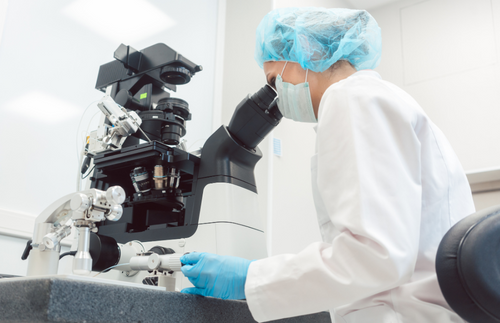Diploma in Medical Laboratory Technology is a 2-year diploma course pursued after the successful completion of the 10+2 level of education. This medical course involves advanced professional learning in:
- Prevention
- Diagnosis
- Treatment of diseases in patients through clinical laboratory tests.
We offer 2-year diploma course in laboratory technology. Our advanced approach towards the course allows the students to learn professional skills and understand real world scenarios. During the program, the students achieve complete attention from the best professionals in the industry. The course provides the understanding of the laboratory organization, maintenance, Blood banking, Clinical Biochemistry, Immunology, General medicine, communication skills and many others. With the complete knowledge of the industry, the students achieve high-quality opportunities after the course completion.

Major components of study that form part of the DMLT Syllabus are:
- analysis of body matter such as: body fluids, tissue, blood.
- micro-organism screening.
- chemical analysis.
- cell count procedures that are used to detect certain diseases in patients.
Such professionals are typically recruited as:
- Medical Lab Technicians
- Technologists.
They are responsible for:
- collecting information.
- sampling it.
- testing.
- reporting and documenting their medical investigations
- conducting research studies supervised by medical researchers.
maintaining report accuracy. - conducting complex tests.
- performing routine tests under stipulated conditions.
- preparing specimens.
operating automated sample-analyzing machines. - arranging and setting up testing equipment.
maintaining lab equipment. - supervising experiments.
- maintaining tools and safe conditions.
- AIDS/HIV
- Diabetes
- Cancer, and others.
Such postgraduates of DMLT are actively involved in the following procedures:
- Blood banking
- Clinical Chemistry (chemical analysis of body fluids)
- Hematology (blood related)
- Immunology (study of immune system)
- Microbiology (study of bacteria and other disease-carrying organisms)
- Cytotechnology (study of human tissue)
- Phlebotomy
- Urine analysis
- Coagulation
- Parasitology
- Blood Sample Matching
- Drug Efficacy Tests
- Serology.
Successful Diploma-holders of the course perform duties such as:
- analyzing human body fluids like: sputum, blood, urine, drug count, cerebrospinal fluid, etc.
- assisting concerned doctor in the treatment of diseases and playing a vital role in alleviating them.
- detecting the presence or absence of certain microorganisms in the patient’s body.
helping physicians find out the root cause of the ailment by detecting and treating disease through samples. - handling, operating, and managing the running of complex electronic equipment.
- operating computers and different types of microscopes used in the documentation of reports.
- carrying out vital tests for deadly diseases like: AIDS/HIV, Diabetes, Cancer, and others.
APPLY NOW
